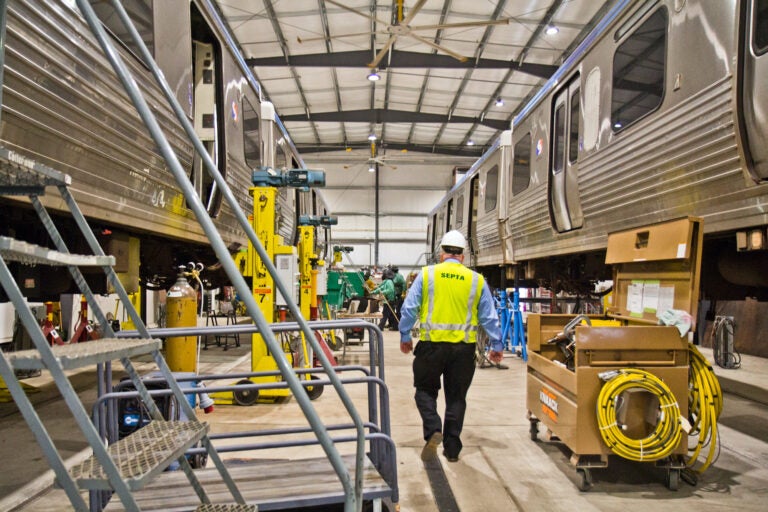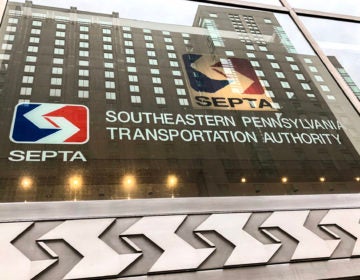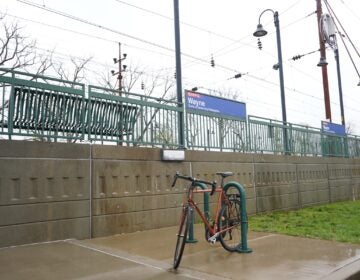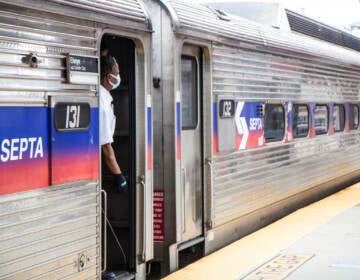SEPTA managers, cops earn double salaries with overtime as agency battles fiscal crisis
A small number of SEPTA managers and police officers, through overtime, earned annual pay comparable to Mayor Jim Kenney and other public executives.

A SEPTA employee walks between two El cars lifted for repairs at the 69th Street SEPTA repair shop. (Kimberly Paynter/WHYY)
At SEPTA, transit police officers earn more than the police chief they report to. Mid-level managers pull in more money than executives. And some employees earn nearly twice what their peers make for doing the same job.
How is it possible? Rampant overtime spending.
Just this week, a SEPTA manager was arrested over an alleged overtime fraud scheme. Financial records obtained by PlanPhilly and Billy Penn showed spending patterns that experts say raise serious questions about oversight, echoing a similar payroll scandal that rocked New York’s Metropolitan Transportation Authority with federal investigations, internal audits and ongoing political battles.
Labor costs account for about 70% of SEPTA’s $1.5 billion budget, and the agency shelled out nearly $59 million just in overtime payments for the fiscal year ending in June 30, 2020. But the overtime money was not distributed equally, with fully half of all OT payments going to just 800 employees, or less than 10% of SEPTA’s 9,200-strong workforce. The majority of the overtime went to maintenance and construction divisions, like one at the heart of an ongoing FBI probe, or the agency’s in-house police force.
Municipal finance experts say that, generally, overtime claims in excess of 20% of a base salary indicate a systemic problem. Yet nearly half of these 800 employees earned more than 50% of their base pay in overtime, and about 45 men earned as much or considerably more than their annual salary.
“I’m just dumbfounded,” Robert Strauss, a professor of economics and public policy at Carnegie Mellon University, said of the spending. “I find that amount of hours worked to be difficult to believe.”
The highest earner was SEPTA Transit Police Lt. Michael Wright, who racked up $116,636 in overtime, pushing his total salary to $211,895. That total means the police lieutenant was the fourth highest-paid SEPTA employee, earning considerably more than SEPTA Police Chief Thomas Nestel’s $175,744 salary and a little less than the $218,000 brought in by Mayor Jim Kenney each year. Two other SEPTA cops, Officer Floyd Whitaker and Sgt. Eltor Sumpter, also earned about as much or more than the top transit law enforcement official.
Nestel referred all questions to SEPTA public relations. Spokesperson Andrew Busch chalked both police and maintenance spending up to the nature of public transit, where crime or infrastructure problems could strike at any time and staff needed to be ready to work long shifts.
“We have everyday emergencies that come up,” Busch said. “On the construction and maintenance side, it could be responding to signal issues that come up, or emergency track work that needs to be performed.”
He added that police-recruiting difficulty has also strained the force’s manpower, resulting in more overtime claims. On the maintenance side, he said a string of maintenance crises and “extreme weather” incidents had necessitated the division’s overtime use.
But some of the top earners were not workers responding to emergencies on the tracks, but rather the “frontline managers” who supervise those laborers. These non-union supervisors are empowered to collect overtime much like rank-and-file workers, guided by agreements hashed out by SEPTA unions. This arrangement has allowed a cadre of mid-level construction and maintenance managers to catapult their salaries to among the highest in the organization.
John Kaminski, Glendale Thomas and James McDaniel earned by far the most overtime out of SEPTA’s 260 mid-level maintenance managers, each asserting close to $90,000 in overtime claims last year. (Kaminski was recently promoted to director of maintenance.) The extra working hours boosted all three men’s salaries to around $165,000, putting them on the same pay rung as executives like Regional Rail director John Lauser or inspector general David Bannan.
Busch defended the overtime payments, asserting that all three were charged with mission- critical maintenance roles, and that SEPTA’s seniority rules meant veteran employees, like the trio, got first dibs.
But Joe Coccio, secretary-treasurer with Transport Workers Union Local 234, which represents many blue-collar SEPTA workers, said it’s because managers have a stronger say in how overtime hours are assigned.
“It’s no secret to us that the top echelon of managers get more overtime, we’ve been seeing that and living that,” he said. “When it comes to the real work that needs to be done on the floor, overtime always seems to be limited.”
A system that creates opening for ‘self-serving behavior’
Chris Zabala, a SEPTA electrician who left the agency in 2016, said that while unionized workers struggled to get their own overtime hours approved, management seemed to be able to easily game the system.
“They would call a guy like me in, a union guy, to justify that a man needed supervision. Then, who knows, the manager goes out [to] breakfast,” he said. “If I were in their position, I would feel stupid not doing it. You see that the people above you don’t care.”
Others said the generous overtime payouts had warped the transit agency’s workplace culture. Managers had incentives to drag out maintenance projects to run up hourly claims. Some intentionally avoid promotion because such a move might, paradoxically, mean more work with less pay.
Kenneth Kriz, director of the Institute for Illinois Public Finance at the University of Illinois at Springfield, said these were common yet harmful phenomena at public agencies.
“If the incentives are put into place that people have the ability to do that,” Kriz said, “then we would expect some potential at least for self-serving behavior.”
Busch acknowledged that overtime payouts, which do not contribute to an employee’s pension, were sometimes a factor in internal promotions.
“It’s just something employees have to consider if they want to move up or stay in that overtime- eligible position,” he said.
SEPTA has been sued in the past for refusing to pay out overtime. In 2015, the agency settled a class-action lawsuit for $13.1 million over claims the agency had forced employees to perform pre-shift work without compensation. But some rank-and-file maintenance staff also saw claims that raised questions –– at the very least, about worker safety.
Electronic specialist Pietro Berardi, for example, earned 1,500 hours of overtime –– $91,000 on top of his $67,000 base salary, for a total annual haul of $159,000. According to Busch, that amounts to working 12-hour shifts, six days a week, every week, for the entire fiscal year.
Busch said even this apparently brutal work schedule did not necessarily raise red flags for the agency.
“It’s not that different from people working two jobs,” Busch said. “It comes down to checking on him and checking on the work to see that the quality is where it needs to be.”
But workers like Berardi handle sensitive maintenance on SEPTA’s Market-Frankford Line cars. Kriz said workloads like his raised questions about safety for everyone involved — including riders who depend on the specialist to keep subway cars in safe operating condition. It also raised questions about the agency’s oversight process, he said.
“Did you see that people were working 76 hours a week? Shouldn’t this have concerned you? Those seem like really obvious questions,” Kriz said.
Big spending during financial crises
Busch said overtime spending was already down in the current fiscal year as SEPTA heads into a critical financial crisis tied to COVID-19. The agency is mulling massive service cuts and recently declined to pay out additional death benefits to workers that succumbed to the virus.
He also underscored that this week’s arrest of frontline manager Ryan Kappler, who was dismissed in January, reflected SEPTA’s commitment to rooting out overtime fraud.
“The numbers are what the numbers are. We know people will see the numbers, and some will look big in relation to what someone’s base salary is,” Busch said. “But not only did [Kappler] lose their job, now they’re in the criminal justice system.”
But former SEPTA employees, like Chris Coyne, weren’t so sure. The former Regional Rail employee, who retired from SEPTA this year, said top agency officials had long known about bloated overtime payouts and more widespread mismanagement.
He said officials’ response in the past had often been to blame a “few bad apples” and move on.
“My hope is that they take a real good look at the top of the SEPTA pyramid, their policies,” Coyne said. “This isn’t a `rank-and-file’ issue. It’s a lack of integrity, accountability and trust, starting from the top.”

Subscribe to PlanPhilly
WHYY is your source for fact-based, in-depth journalism and information. As a nonprofit organization, we rely on financial support from readers like you. Please give today.









